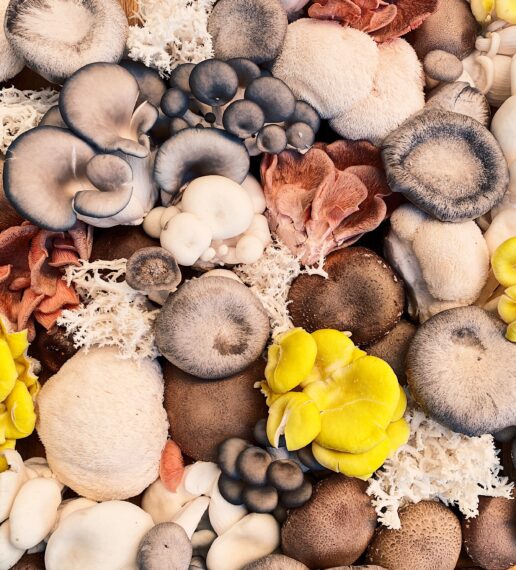This Is Why Mushrooms Are Superfoods
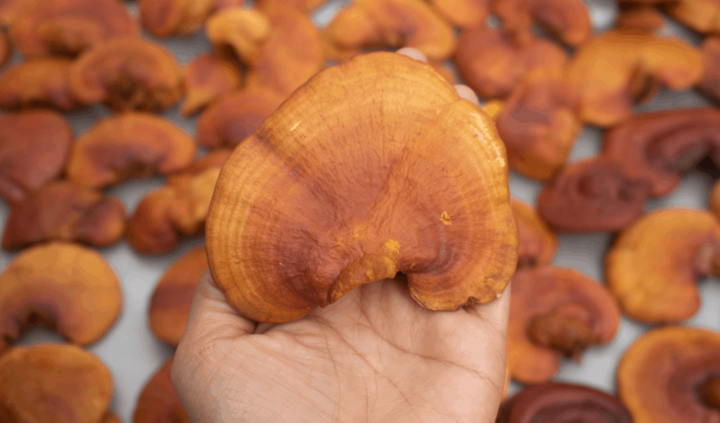
You’re stressed. Tired. Cranky.
And your last workout definitely wasn’t up to par.
According to Dr. Google, superfoods could be the ultimate solution! The problem? It seems like just about everything is being touted as a superfood these days, and the “most effective” ones tend to cost more per serving than you spent on your entire first semester at college.
And then there are mushroom superfoods.
While most people think of mushrooms as generic white or brown caps that come packaged in plastic, they’re actually little heroes of the fungal kingdom — enough to deserve the “super” label.
But what classifies mushrooms as a superfood, and how can something that grows on decaying plant matter kick your daily performance into high gear?
Let’s start by taking a look at what superfoods actually are.
What is a superfood?
The Merriam-Webster dictionary defines a superfood as:[1]
“A food … that is rich in compounds (such as antioxidants, fiber, or fatty acids) considered beneficial to a person’s health.”
Right away, that disqualifies any processed sugary snack regardless of the claims on the label, which explains why the “healthy” post-workout bars you’ve been tossing in your gym bag don’t seem to do much.
True superfoods are often whole, unprocessed or lightly processed foods containing high levels of nutrients without a lot of calories. This nutrient density makes superfoods suitable to include in any healthy dietary pattern.
The problem with labeling something as a superfood, including mushrooms, is that there’s no scientific definition of the term. It was actually invented by the United Fruit Company in the early 1900s to market bananas[2] and still persists as a buzzword in marketing.
When you see a food or product touted as “super,” you need to investigate why it has that label and whether consuming it has any real benefits.
What makes mushrooms a superfood?
When it comes to mushrooms, their seemingly magical qualities aren’t a new discovery.
People in Asian countries have been using mushrooms as part of traditional health regimens for thousands of years.
Today, companies around the world are adding many of these same medicinal mushroom varieties to everything from coffee to chocolate.
What happened?
People in modern societies have started to realize what Eastern medicine has known all along:
Mushrooms have serious power when it comes to supporting your health*.
It’s no wonder these functional fungi have been cited as one of the biggest food trends of the year.[3]
Mushroom Nutrition: The Power of Beneficial Mushrooms
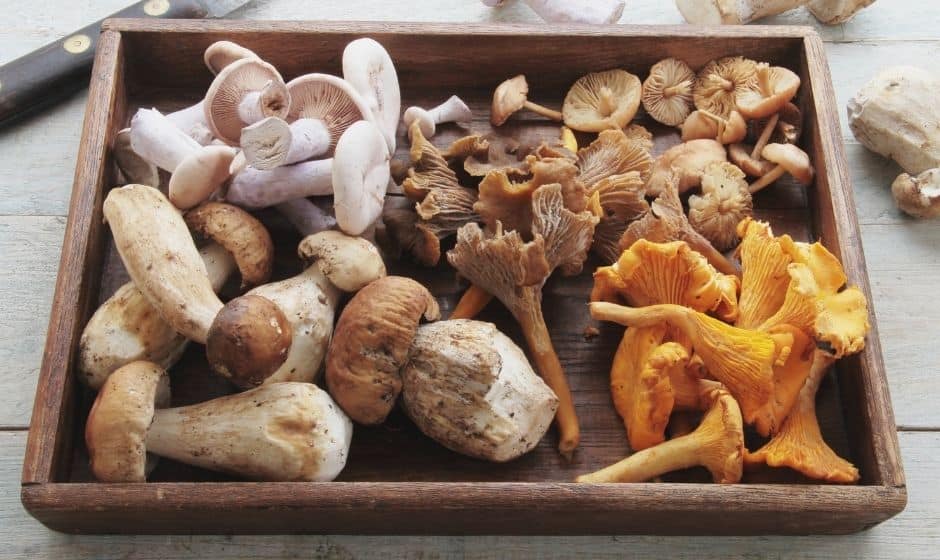
“Trendy” doesn’t equate to “hype” when it comes to mushrooms.
You don’t even have to make a foray into medicinal mushroom territory to start getting benefits; typical culinary varieties from the supermarket give you plenty of nutritional bang for your buck.
Mushrooms as a Superfood in Cooking
Take crimini mushrooms, for example. Sometimes sold as “baby bellas,” these little brown ‘shrooms are good sources of:[4]
- Copper
- Selenium
- Protein
- Vitamins B2, B3 and B5
Shiitake mushrooms have a similar nutritional profile, including up to 72% of your daily value of copper in a single serving.[5]
They’re also a good source of zinc, a mineral involved in over 100 enzyme systems in the body.
So just by eating regular old mushrooms, you provide your body with nutrients it needs to support your thyroid, bones, tissues and hormones while boosting energy, fighting oxidative stress and supporting proper fat utilization and storage.
Digging Deeper: Super Mushroom Nutrients
Mushrooms are known for being sources of unique proteins, carbohydrates and antioxidants that carry out specific functions when eaten or taken in supplement form.
Anti-Inflammatory, Pro-Immune
Two particular carbohydrates in mushrooms, glucans and heteroglucans, have both anti-inflammatory and immune benefits. These complex carbs can act as COX-2 inhibitors, similar to some over-the-counter pain medications, but without the potential side effects. They’ve also been shown to increase macrophage activation, boosting your immune system’s response to invading pathogens*.
Shiitake mushrooms contain another carbohydrate called lentinan with antioxidant and anti-inflammatory properties*.[6] Along with the sulfur-containing amino acid ergothioneine found in many mushrooms, lentinan helps combat oxidative stress by reducing free radical activity*.[7]
Translation: less cellular damage, lower levels of inflammation and less potential for developing chronic diseases*.
A Happier, Healthier Gut
Complex carbohydrates also act as prebiotic “food” for the trillions of microbes living in your gut. Mushroom polysaccharides — carbs made up of long chains of sugars — provide a source of dietary fiber that travels through your digestive system to your colon, where the resident “good bugs” digest it for you*.
Regularly feeding your gut microbes keeps bad bacteria in check, encourages diversity and promotes balance, all of which are associated with better overall health*.[8] Byproducts produced when fiber is broken down, including short-chain fatty acids (SCFAs), strengthen your gut, which can also help improve your immune response*.
Which mushrooms have the most benefits?
Although all mushrooms are amazing in one way or another (usually multiple ways!), some have benefits that can help you reach specific goals. We’ve highlighted three top “life optimizing” mushrooms that can help you:
- Sleep better*
- Stress less*
- Reduce sick days*
- Recover from workouts faster*
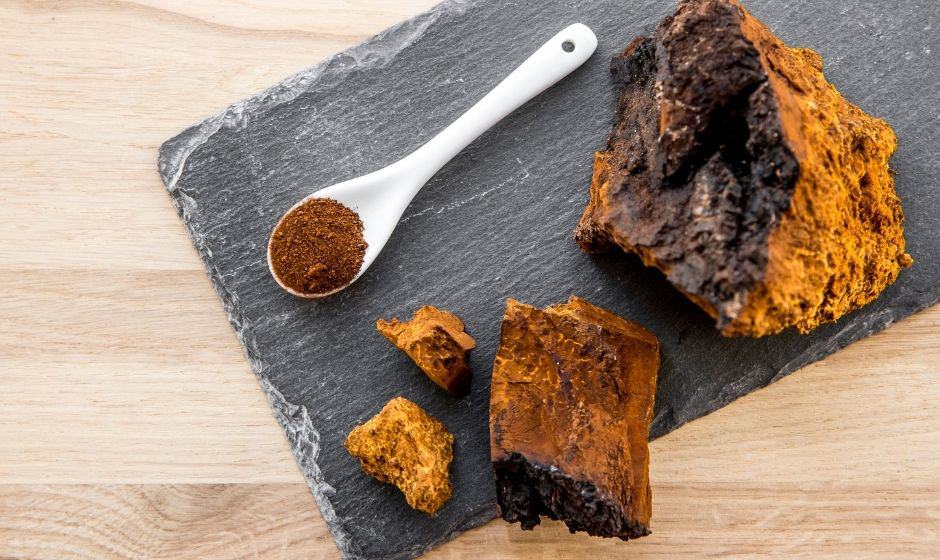
Chaga Mushrooms: So Many Antioxidants, It’s Almost Crazy
Scientific name: Inonotus obliquus
If you could only choose one mushroom to supercharge your life, make it Chaga! Chaga mushrooms grow in large chunks on the trunks of trees and have one of the highest antioxidant concentrations of any known food.
All those antioxidants make Chaga pretty much an “anti-everything-bad” mushroom with the ability to:
- Reduce inflammation*
- Modulate immune responses*
- Support balance throughout body systems*
Choose a high-quality supplement to get the biggest dose of Chaga antioxidants.
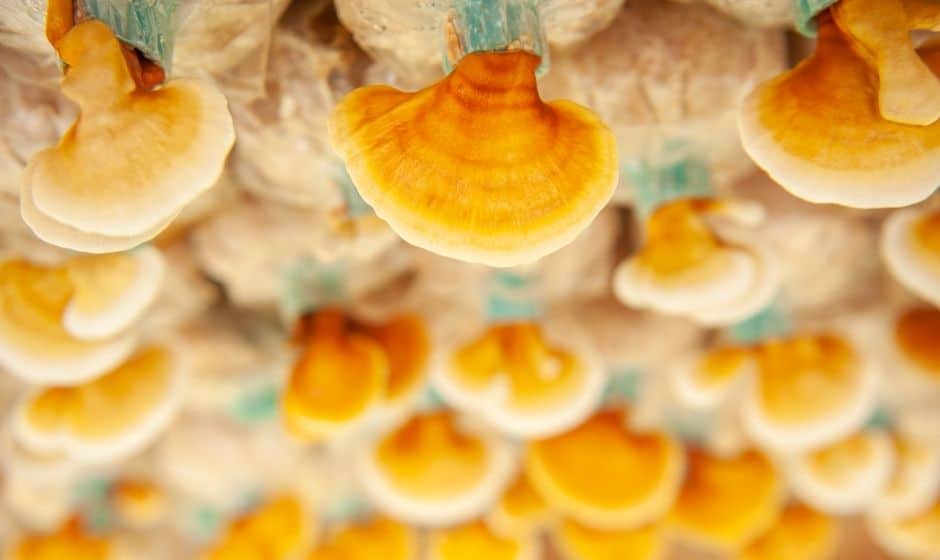
Reishi Mushrooms: Chill Out and Sleep Like a Baby
Scientific name: Ganoderma lucidum
Thanks to compounds called triterpenes, Reishi is a good companion when you can’t seem to get a good night’s rest. Triterpenes promote hormonal balance, which can translate into lower stress levels and better sleep*.
Reishi is also associated with:
- Stronger immunity*
- Better blood sugar balance*[9]
- Reduced inflammation*
Some evidence suggests reishi’s effects on the gut microbiome may provide additional benefits for weight management*.[10]
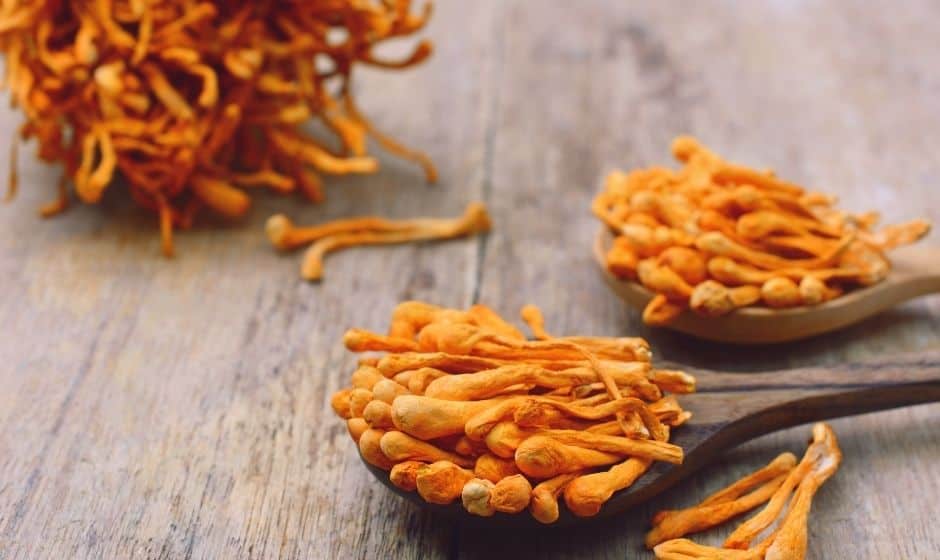
Cordyceps Mushrooms: Totally Legal Workout Enhancement
Scientific name: Cordyceps militaris
Cordyceps is every gym lover’s dream mushroom. Its dual ability to strengthen immunity and boost energy production can help prevent missed workouts due to illness and enhance performance when you do hit the gym*.
Cordyceps mushrooms benefit the body by:
How do I get the most out of mushroom superfoods?
The tastiest way to make mushrooms part of your life is to eat them!
Experiment with cuisines that include different culinary mushrooms, like portobellos in Italian food or shiitake and oyster in Asian dishes.
Hunt down harder-to-find mushrooms at your local health food store or farmer’s market to enjoy more variety.
For a concentrated dose of ‘shroomy goodness, consider supplements, tinctures or superfood mushroom powders.
These more potent options offer better nutrient bioavailability to get a higher level of health-supporting compounds into your system*. Mushroom supplements may also combine several types of mushrooms into one product to deliver a wider range of benefits*.
When shopping for any form of supplement, look for mushroom products made with the fruiting body instead of mycelium grown on grain.
Powders are particularly versatile; you can add them to beverages, smoothies and meals for a delicious health boost!
Ongoing research continues to show promising evidence to support the “super” status of mushrooms*.[13]
More human clinical trials are needed to uncover all the potential hiding in these little powerhouses, but in the meantime, you can experience the known benefits for yourself by incorporating mushrooms as a superfood to power your daily routine*.
